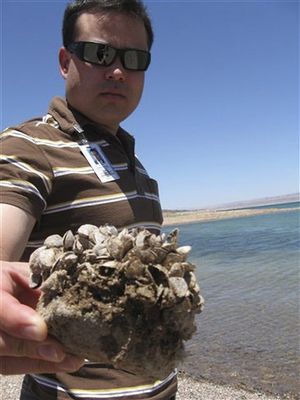Invasive mussels knocking on Idaho’s door, official says
INVASIVE SPECIES -- Having the invasive quagga mussels booming in Utah's Lake Powell is like having a deadly contagious disease at a major national airport with folks coming and going in all directions -- including Idaho, a federal biologist says.
He's trying to get the word out before boaters flood out of Idaho to Utah for spring break.
Here's the story from Rob Thornberry of the Idaho Falls Post Register:
With Utah finding more quagga mussels in Lake Powell, the likelihood they will find their way to Idaho is increasing, said Lee Mabey, a forest fisheries biologist with the Caribou-Targhee National Forest.
Having the mussels in Lake Powell is like having a deadly contagious disease at a major national airport with folks coming and going in all directions, including Idaho, Mabey said. The rate of spread of the mussels could be very rapid now that Lake Powell is infected.
Mabey is trying to raise awareness of the problem before people travel south for spring break.
Data from the Idaho Department of Agriculture’s five years of boat inspections indicates Lake Powell is the most frequently visited mussel-fouled water body by Idaho boaters. Many of these vessels have been out of the water less than 30 days at the time they are inspected, posing a significant risk of transporting larval or adult mussels to the Gem State.
In 2013, Idaho inspected 568 boats that had recently come from Mead, Powell, Mohave, Havasu or Pleasant lakes. All those waters have mussels.
Idaho does not, and officials are keen on keeping it that way.
If quagga or zebra mussels take hold in Idaho, the state’s lake fisheries will be forever changed and the irrigation and hydropower industry could face millions of dollars in added expenses. Undoubtedly these expenses will be passed on to the consumer, Mabey said.
Quagga mussels are prolific breeders and attach themselves to hard and soft surfaces. Once in a lake, they filter plankton from the water, robbing fish of food.
“If we get these mussels in our lakes, it is going to turn the ecology upside down,” Mabey said. “Our fish populations would crash. It is simple biology — a lake only supports so much biomass. You can have plankton and fish or you can have plankton and mussels.”
Mabey encourages all anglers and boaters to take the threat seriously and learn about proper precautions to keep the marauders out of Idaho.
- Click here for more information on steps boaters can take to prevent spread of invasive mussels.
“We need everybody to take part in prevention,” he said. “We can’t rely on just inspection stations. We need to have a change in mentality of all users. Just like anglers have adopted catch-and-release regulation, we need boaters and all water users to adopt clean, drain and dry after each excursion.”
Jordan Nielson, a Madison High School graduate, is the aquatic invasive species coordinator for the Utah Division of Wildlife Resources. He said government agencies are doing well to slow the spread of mussels, but those efforts will be wasted if boaters don’t change their habits.
“We need a paradigm shift,” he said. “The state agency can only do so much. People have to realize they have a responsibility when they go boating to make sure they aren’t moving things around. It is essential.”

